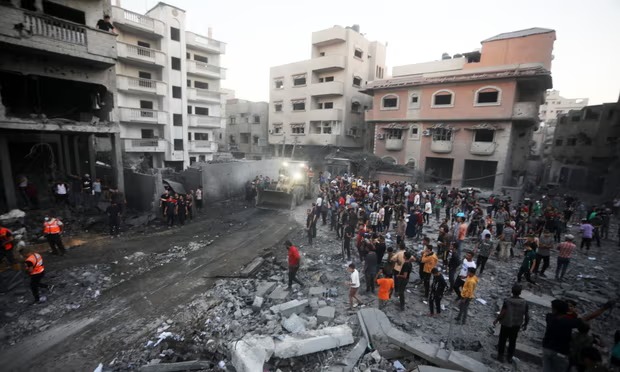UN humanitarian coordinator Lynn Hastings has sounded the alarm, describing the ongoing situation in Gaza as “unprecedented” and “catastrophic.” The series of events that unfolded on October 7th, compounded by Hamas attacks, were already abhorrent, but the plight of Gaza’s residents has reached a new level of despair, as Hastings emphasized, “It really can lead nowhere for the Palestinians who live in Gaza.” The grim reality of this humanitarian crisis poses a severe threat not only to the people of Gaza but also to our shared humanity.
Gaza in Crisis: Unprecedented Situation Unfolds
Hastings’ words reverberate with a sense of urgency, underscoring that the crisis in Gaza is unlike anything seen before. The continuous bombardments, destruction, and suffering have pushed the enclave to the brink of a humanitarian abyss. Transitioning into her observations on the ground, it’s apparent that the Gaza Strip’s healthcare system has buckled under the pressure due to a severe lack of fuel. Hospitals are struggling to provide essential medical care to those in need, leaving the most vulnerable in a state of peril. The magnitude of this crisis demands swift international intervention and a reevaluation of the ongoing conflict.
Healthcare System in Gaza on the Brink of Collapse
The healthcare system’s collapse in Gaza is a devastating consequence of the ongoing turmoil. Hospitals are on the verge of running out of fuel to power generators, making it impossible to perform surgeries, provide life-saving treatments, and maintain critical medical services. The lack of fuel has also disrupted the transport of essential medical supplies, leaving patients without access to vital medications and equipment. The crisis has pushed Gaza’s healthcare infrastructure to its limits, jeopardizing countless lives. The need for an immediate ceasefire, as advocated by the UN, is not just a humanitarian call; it is an imperative to prevent further catastrophe.
UN Pleads for Ceasefire Amid Impossible Evacuation Orders
Amidst this turmoil, Hastings has also raised concerns about evacuation orders imposed by the Israeli military on over a million Palestinians living in northern Gaza. The UN official, while asserting the impossibility of such an order, highlights the harsh realities faced by the affected population. Many lack the means for transportation, with Gaza’s dwindling fuel supply making any journey seem insurmountable. Furthermore, hospitals in the north have received evacuation notices, an order that seems almost cruel considering the medical conditions of the patients within. The Ministry of Health’s inability to facilitate this evacuation, coupled with the UN’s limited capacity, underscores the dire need for a ceasefire and international humanitarian assistance.
As the situation in Gaza deteriorates further, the international community must heed Lynn Hastings’ call for an immediate ceasefire and humanitarian intervention. The unparalleled suffering of Gaza’s residents, coupled with the impending collapse of the healthcare system and impossible evacuation orders, necessitate an urgent response. Failure to act promptly not only imperils the lives of the innocent but also tarnishes our collective humanity. It is now a critical moment for nations worldwide to come together to end this unprecedented and inhumane crisis in Gaza before it reaches the point of no return.
















